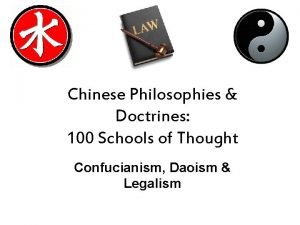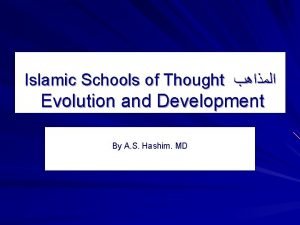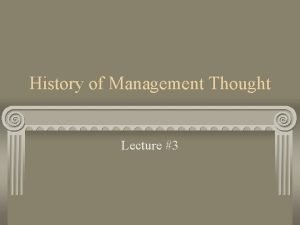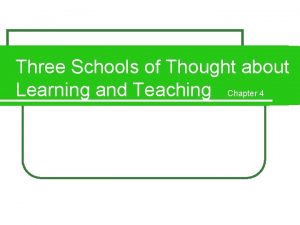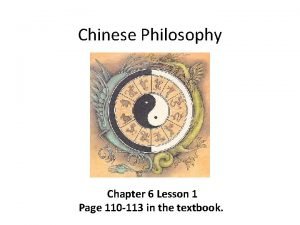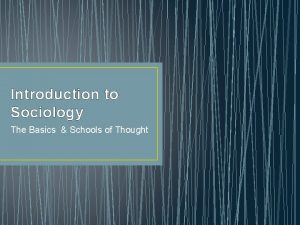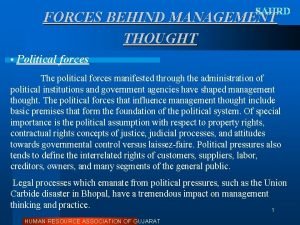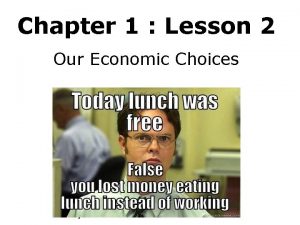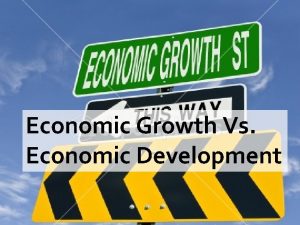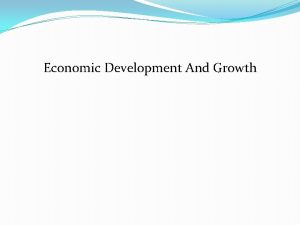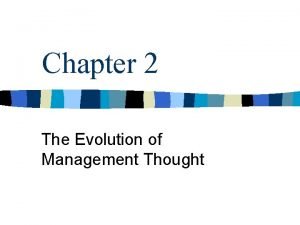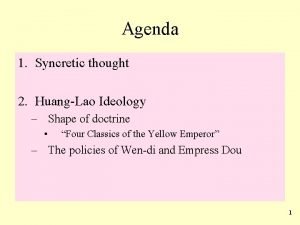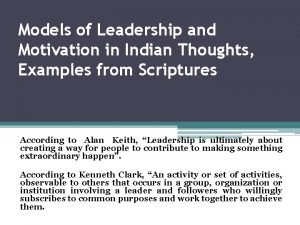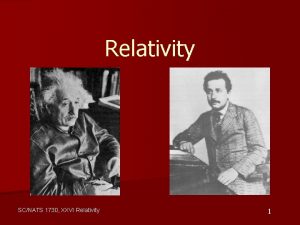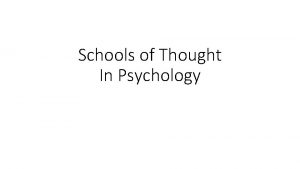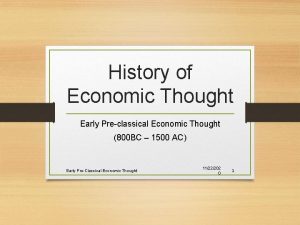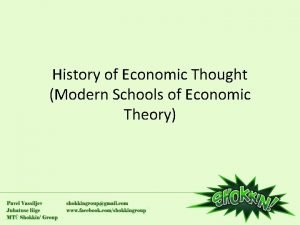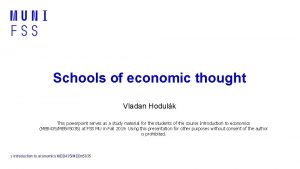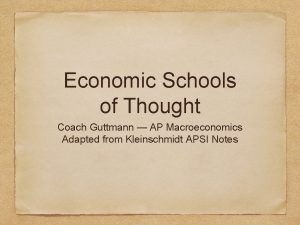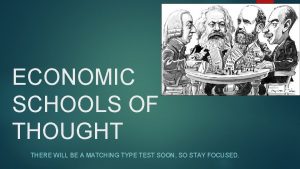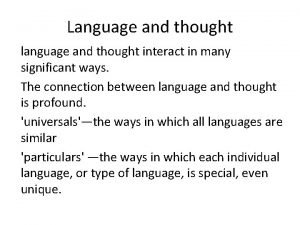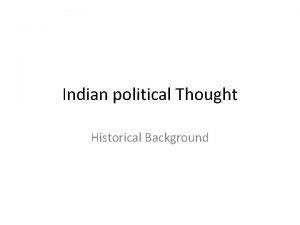ECONOMIC SCHOOLS OF THOUGHT ECONOMIC SCHOOLS OF THOUGHT




















- Slides: 20

ECONOMIC SCHOOLS OF THOUGHT

ECONOMIC SCHOOLS OF THOUGHT 1. The Classical school 2. Marxism 3. Keynesian Economics 4. Neoclassical Economics 5. The Austrian School

CLASSICAL SCHOOL The belief that the rapidly adjusting market (left to its own devices) will naturally ensure equilibrium, stability and prosperity.

ADAM SMITH AND THE CLASSICAL SCHOOL This school of thought placed great emphasis of the ability of the markets to adjust to economic shocks. Through its “invisible hand”, markets reconcile the actions of people and markets without the need for state intervention, moving towards a ‘rational’ state. Government stimulus, policies and interventions are seen to artificially restrict the ability of the market to form a new, optimal equilibrium. HOWEVER frequent economic crises demand the question – how quickly can markets actually adapt?

ARE GOVERNMENT INTERVENTIONS NECESSARY, OR CAN THE MARKET ALONE SUSTAIN EQUILIBRIUM, STABILITY AND PROSPERITY?


Q: IS THERE EVIDENCE OF THE INFLUENCE OF THE CLASSICAL SCHOOL IN CONTEMPORARY SOCIETY? WHAT DOES THIS IMPLY?

MARXISM The belief that capitalism requires profit, and profit requires exploitation. But can exploitation produce socialism?

KARL MARX In the context of the industrial revolution, Karl Marx sought to unravel industrial capitalism. Arguing that every worker and commodity has a USE value (e. g. the ability to produce goods and services) and an EXCHANGE (monetary) value (a wage to meet living costs), he states that the PROFIT taken by employers through the production of workers is considered exploitation, as the commodities produced are worth more than the worker’s exchange value. Marx argues that it is profit that allows capitalism to grow, perpetuating further circles of exploitation. He stated that in this system, workers would eventually seize control of the means of production to establish a socialist economy.

HOW CAN MARXISM PROVIDE A LENS TO UNDERSTAND CRITIQUE OUR MODERN CAPITALIST ECONOMY?


KEYNESIAN ECONOMICS The belief that business cycles are driven by how much people are prepared to spend, and that when demand fails, recession follows.

JOHN MANYARD KEYNES AND ECONOMIC GROWTH This theory focuses on the perpetuation of economic growth through a demand driven, consumer led economy. Keynes states that aggregate (total) demand is a key driver of the business cycle, where booms of economic activity accelerates growth and employment, but periods of economic downturns lead to a decline in available jobs. Keynes believed that by manipulating aggregate demand, governments could influence the business cycle. Thought Bites: How can governments do this? Role of Monetary and Fiscal Policy What about the impacts of innovation and investment?

Q: IS THERE EVIDENCE OF THE INFLUENCE OF KEYNESIAN ECONOMICS IN CONTEMPORARY SOCIETY? WHAT DOES THIS IMPLY?

THE NEOCLASSICAL SCHOOL The belief that Keynes was right in the short term, but the classical school was right about the long term, and that Government intervention should be restricted to the short term.

NEO-KEYNESIANS AND THE NEOCLASSICAL SYNTHESIS Paul Samuelson, a prominent ‘Neo Keynesian’ suggested that in the short term, markets were imperfect and therefore didn’t always adjust automatically, mainly due to the rigidity of wages and the statistical distortion caused by monopolies on competition. Therefore, the government can fix these problems in the short term (e. g. boost spending in economic downturns). However, in the longer term, the markets would eventually arrive at an equilibrium naturally, reaffirming the role of the invisible hand in expanding an economy’s growth.


THE AUSTRIAN SCHOOL The belief that only individuals know how they value things, and only the market can efficiently coordinate everyone’s preferences. No government can know better than the markets.

FATHERS OF RIGHT WING LIBERTARIANISM? The Austrian School argues that socialism ruled out rationalism (Ludwig von Mises) and was far less efficient than capitalism (Friedrich von Hayek) as individuals alone had the ability to subjectively determine their own costs and benefits. Thus, a liassez-faire approach to the market allows prices to be the driver of an economic equilibrium, as it is perceived as the collective determinant of perceptions of VALUE. Thought Bites: What happens to decisions that need to be made collectively as a society?

Q: IS THERE EVIDENCE OF THE INFLUENCE THE AUSTRIAN SCHOOL IN CONTEMPORARY SOCIETY?
 Complete and incomplete thought examples
Complete and incomplete thought examples 100 schools of thought philosophy
100 schools of thought philosophy Islamic schools of thought map
Islamic schools of thought map Schools of thought in criminology
Schools of thought in criminology Taylor shovel experiment
Taylor shovel experiment What are the three main schools of thought?
What are the three main schools of thought? Han feizi quote
Han feizi quote Macrosociology
Macrosociology Major schools of thought in psychology
Major schools of thought in psychology Safety reach target
Safety reach target Powerschool login huntsville city schools
Powerschool login huntsville city schools Forces behind management thought
Forces behind management thought Economic systems lesson 2 our economic choices
Economic systems lesson 2 our economic choices Economic growth vs economic development
Economic growth vs economic development Conclusion of growth and development
Conclusion of growth and development You thought of us before the world began to breathe lyrics
You thought of us before the world began to breathe lyrics What is an example of a trope
What is an example of a trope Evolution of management thought
Evolution of management thought Syncretic thought
Syncretic thought Models of motivation in indian thoughts
Models of motivation in indian thoughts Relativity definition
Relativity definition

